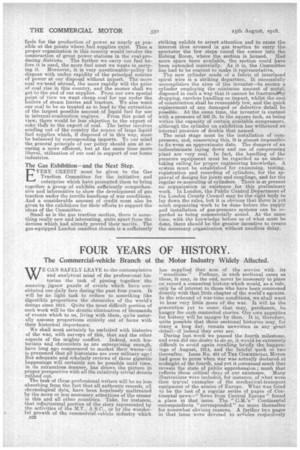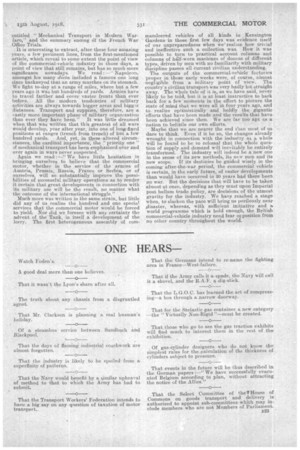FOUR YEARS OF HISTORY.
Page 2

Page 3

If you've noticed an error in this article please click here to report it so we can fix it.
The Commercial-vehicle Branch of the Motor Industry Widely Affected.
WE CAN SAFELY LEAVE to the contemplative and analytical mind of the profess:onal historian the task of piecing together the amazing jigsaw puzzle of events which have constituted our daily fare during-the past four years..It will be no light task to reduce to something like digestible proportions the chronicles of the world's doings since 1914. Quite the most difficult portion of such work will be the drastic elimination of thousands of events which to us, living with them, quite naturally assume proportions entirely out of focus with their historical importance.
We shall most certainly be surfeited with histories of the war, with surveys of this, that and the other
aspects of the mighty conflict. Indeed, such historians and chroniclers as are enterprising enough, have long ago commenced to market their wares—it is presumed that all historians are over military age! But adequate and scholarly reviews of these gigantic happenings will certainly not be possible until time, in its miraculous manner, has drawn the picture in proper perspective with all the relatively trivial details rubbed out.
The task of the sse professional writers will he noless absorbing from the fact that all authentic records, all chronological data, have been hopelessly maltreated by the more or less necessary attentions of the censor in this and all other countries. Take, for instance, that infinitesimal portion of the story represented by the activities of the MT., A.S.C., or by the wonderful growth. of the -commercial-vehicle industry which
B22
has supplied that arm of the service with its "munitions." Perhaps, in such sectional cases as these, it may, in the end, never be necessary to place on record a connected history.which would, as a rule, only be of interest to those who have been concerned directly with that little chapter of the world's agonies. In the rebound of war-time conditions, we shall want to bear very little more of the war. It will be the generation yet to come that may, perchance, be hungry for such connected stories. Our own appetites for history will be meagre by then. It is, therefore, quite possible that these sectional histories may, for many a long day, remain unwritten in any great detail—if indeed they ever are.
During last week we passed the fourth milestone, and even did one desire to do So, it would be extremely difficult to avoid again recalling briefly the happenings of August, 1914, and the fateful week or two thereafter. Issue No. 491 of THE COMMERCIAL MOTOR had gone to press when war was actually declared, at midnight. of the fourth, and yet it contained namh that, reveals the state of public apprehension ; much that reflects those critical days of our existence. Many illustrations were included, for instance, of what were then typical examples of the mechanical-transport equipment of the armies of Europe. What was fated to be the last of a regular series of pages of Continental news—" News from Central Europe" found a place in that issue. The " C.M.'s " Continental correspondents "corresponded" no more thereafter for somewhat obvious reasons. A further two pages in that issue were devoted to articles respectively
entitled " Mechanical Transport in Modern Warfare," and the summary ending cif the French War Office Trials.
It is interesting to extract, after these four amazing .years, a few pertinent lines, from the first-mentioned article, which reveal to some extent the point of view of the commercial-vehicle industry in those days, a point of view that still remains, but has so much more
significance nowadays. We read :—'` Napoleon, amongst his many dicta included a famous one long since hackneyed that an army marches on its stomach. We fight to-day at a range of miles, where but a few years ago it was but hundreds of yards. Armies have to travel farther and cover vaster fronts than ever before. All the modern tendencies of military activities are always towards bigger areas and bigger distances. Transport and supplies, therefore, are a vastly more important phase of military organization than ever they have been." It was little dreamed when that was written that this greatest of all wars would develop, year after year, into one of long-fixed positions at ranges (trench from trench) of but a few hundred yards. And, yet, in these .altered circumstances, the cardinal importance, the "priority one" of mechanical transport has been emphasized over and over again in ways never suspected.
Again we read :.--" We have little hesitation in bringing ourselves to believe that the commercial motor, whether in the service of the armies of Austria, Prussia; Russia, France or Serbia, or of ourselves, will so substantially improve the possibilities of successful military operations as to render it certain that great developments in connection with its military use will be the result, no matter what the outcome of the international Struggle."
Much more was written in the same strain, but little did any of us realize the hundred and one special services that the commercial motor would be forced to yield. Nor did we foresee with any certainty the advent of the Tank, in itself a development of the lorry. The first heterogeneous assembly of corn rnandeered vehicles of all kinds in Kensington Gardens in those first few days was evidence itself of our unpreparedness when we' realize how trivial' and ineffective such a collection was. How it was possible to turn to practical account columns and columns of 1-1117,11-worn machines of dozens of different types, driven by men with no familiarity with military discipline passes all current civilian understanding. The outputs of the commercial-vehicle fa eta' ies proper in those early weeks were, of course, almost 'negligible from a military point of -view. The country's civilian transport was very badly hit straight away. The whole tale of it is, as we have said, never likely to be told, but it is at least, instructive to hark back for a few moments in the effort to Picture the state of mind that we were all in four years ago, and to realize optimistically and boldly the gigantic efforts that have been made and the results that have been achieved since then. We are far too apt as a nation to belittle our own efforts.
Maybe that we are nearer the end than most of us dare to think. Even if it be so, the changes already wrought in connection with the industry as a, whole will be found to be so colossal that the whole Ctuestion of supply and demand will inevitably be entirely transformed. The industry will indeed be a new one in the sense of its new methods, its new men and its new scope. If its destinies be guided wisely in the coming after-the-war period, the commercial vehicle is certain, in the early future, of vaster developments than would have occurred in 20 years had there been no war. But the decisions that will have to be taken almost at once, depending as they must upon Imperial post bellurn trade policy, are decisions of the utmost gravity for the industry. We have reached a stage when to slacken the pace will bring us perilously near /disaster, whereas, with sufficient initiative and a world programme which is bold enough, the British commercial-vehicle industry need fear opposition from no other country throughout the world.






















